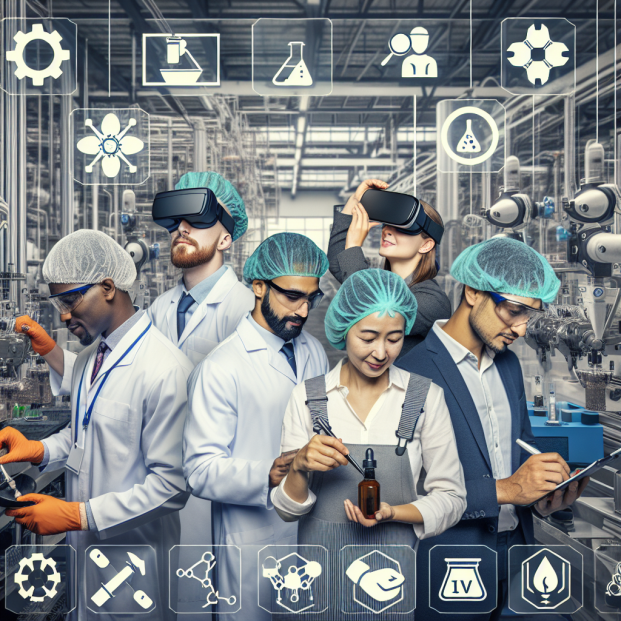
The pharmaceutical industry is witnessing a technological transformation with the rise of Extended Reality (XR), which includes Virtual Reality (VR), Augmented Reality (AR), and Mixed Reality (MR). This technological advancement is revolutionizing manufacturing and maintenance, offering enhanced precision, efficiency, and collaboration. Here’s how XR is making a significant impact:
Enhanced Training and Skill Development
In pharmaceutical manufacturing, XR plays a pivotal role in training and skill development. Traditional training methods often involve significant time and resources, whereas XR offers immersive, hands-on experiences without the need for physical materials.
- Immersive Training: VR simulations replicate complex machinery and processes.
- Efficient Learning: Reduces training time and resources compared to traditional methods.
- Error Reduction: Provides a risk-free environment for workers to practice and master procedures, minimizing human errors.
Real-Time Assistance and Troubleshooting
AR, a subset of XR, is particularly beneficial in providing real-time assistance and troubleshooting. AR devices, such as smart glasses, overlay digital information onto the physical world, guiding technicians through intricate procedures step-by-step.
- AR Guidance: Smart glasses and other AR devices overlay digital information onto the physical world.
- Step-by-Step Instructions: Guides technicians through intricate procedures, enhancing accuracy.
- Instant Access: Provides real-time access to technical manuals, schematics, and data analytics.
- Reduced Downtime: Ensures smooth and efficient manufacturing line operations.
Remote Collaboration
XR facilitates remote collaboration, a significant advantage in a globalized industry. Experts from different parts of the world can participate in virtual environments to diagnose issues, provide guidance, and even conduct inspections without the need for travel.
- Global Connectivity: XR enables experts from different parts of the world to collaborate in virtual environments.
- Virtual Inspections: Allows for remote diagnosis, guidance, and inspections without travel.
- Pandemic Adaptation: Highlights the value of remote solutions, especially during events like the COVID-19 pandemic.
Quality Control and Assurance
XR also contributes to quality control and assurance in pharmaceutical manufacturing. MR, which combines elements of both VR and AR, allows for sophisticated modeling and simulation of manufacturing processes.
- Sophisticated Modeling: MR allows for advanced modeling and simulation of manufacturing processes.
- Issue Identification: Helps identify and rectify potential issues before they arise.
- Regulatory Compliance: Ensures production meets stringent quality standards required by regulatory bodies.
The Future of XR in Pharmaceuticals : As XR technology continues to evolve, its integration into pharmaceutical manufacturing and maintenance is expected to deepen. The ongoing advancements will further enhance efficiency, ensure high-quality production, and facilitate the creation of safe and effective medications. Embrace the XR revolution in the pharmaceutical industry for a future of streamlined processes and unparalleled precision.
To unlock the transformative power of Extended Reality (XR), HindXR pioneers immersive learning with its XR platform, catering to various sectors like Healthcare, Pharmaceutical, Agriculture, and Defense. Compatible across devices, it aims to train 1 million professionals by 2030, revolutionizing workforce development with seamless, accessible XR experiences.
Author:
Aditya Walia / HindXR.com
+919068408999
Hindomain Technologies Private Limited
- SEO Powered Content & PR Distribution. Get Amplified Today.
- PlatoData.Network Vertical Generative Ai. Empower Yourself. Access Here.
- PlatoAiStream. Web3 Intelligence. Knowledge Amplified. Access Here.
- PlatoESG. Carbon, CleanTech, Energy, Environment, Solar, Waste Management. Access Here.
- PlatoHealth. Biotech and Clinical Trials Intelligence. Access Here.
- BlockOffsets. Modernizing Environmental Offset Ownership. Access Here.
- Source: Plato Data Intelligence.



